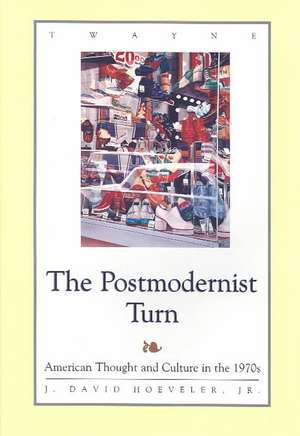Studies in the American Thought and Culture Series: Atc in the 1970s: Twayne's American Thought & Culture
Autor J. Hoeveleren Limba Engleză Hardback – 30 sep 1996
Each volume provides:
-- A chronology of influential ideas and cultural trends, and associated historic events
-- Lucid interpretation of intellectual activity at the time
-- Illustrations accenting key concepts
-- A bibliographic essay
-- A comprehensive index
Preț: 390.16 lei
Nou
Puncte Express: 585
Preț estimativ în valută:
74.66€ • 78.15$ • 62.14£
74.66€ • 78.15$ • 62.14£
Carte indisponibilă temporar
Doresc să fiu notificat când acest titlu va fi disponibil:
Se trimite...
Preluare comenzi: 021 569.72.76
Specificații
ISBN-13: 9780805790641
ISBN-10: 0805790640
Pagini: 225
Dimensiuni: 162 x 241 x 22 mm
Greutate: 0.59 kg
Ediția:Text mare
Editura: Twayne Publishers
Seria Twayne's American Thought & Culture
ISBN-10: 0805790640
Pagini: 225
Dimensiuni: 162 x 241 x 22 mm
Greutate: 0.59 kg
Ediția:Text mare
Editura: Twayne Publishers
Seria Twayne's American Thought & Culture
Textul de pe ultima copertă
In this reassessment of a little studied decade, J. David Hoeveler, Jr., finds that the sense of detachment and dislocation that characterizes the postindustrial society serves as a paradigm for American thought and culture in the 1970s. The book examines major developments in literary theory, philosophy, architecture, and painting as expressions of a 1970s consciousness. It also looks at the rival "political" readings of these subjects and considers the postmodernist phenomenon as it became an ideological battleground in the decade. Although the new continental thinking promised to revitalize the American Left, Hoeveler shows how the American readings actually fortified more traditional norms in American thought. Thus, as the works of Claude Levi-Strauss, Michel Foucault, and Jacques Derrida gained much attention in academic circles, American readings domesticated the European concepts. The Yale School of critics receives particular attention, as do historian Hayden White, anthropologist Clifford Geertz, literary scholar Edward Said, and a host of other important participants in the intellectual debates of the 1970s. Hoeveler also treats the merging of postmodernist thought with the older American tradition of pragmatism. In his insightful analysis of Richard Rorty's seminal works from the 1970s, Hoeveler reveals a strain of postmodernist thought that is liberal, playful, and creative, and, as he suggests, an "ideal that might best assure the American tradition a viable future".




